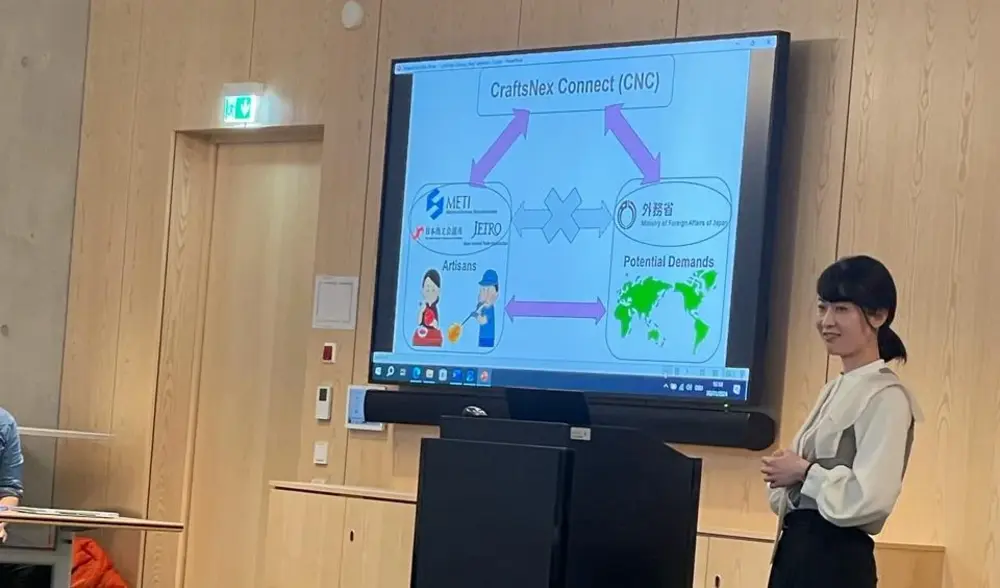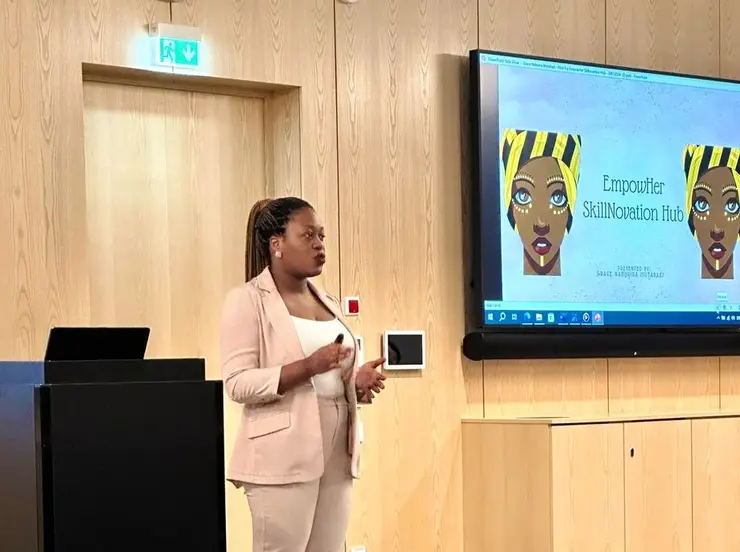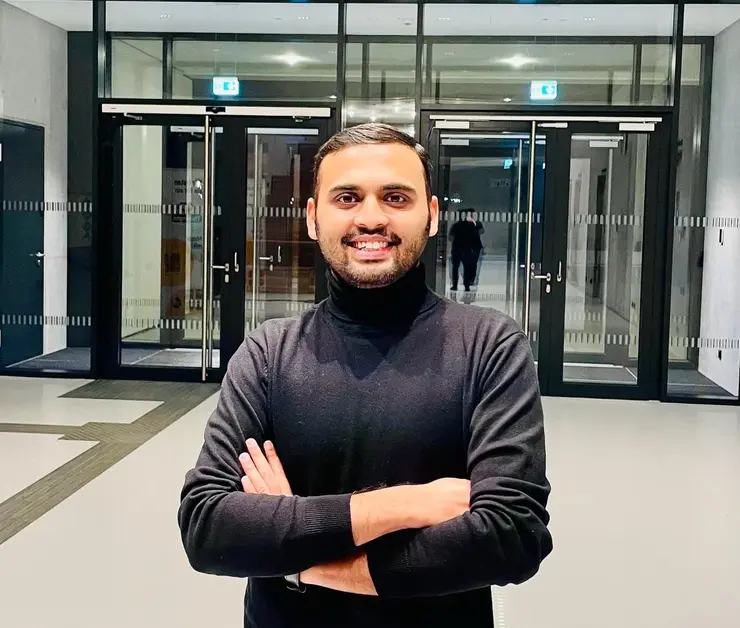Social Impact Lab: A vista of opportunity to translate great ideas into reality

Muhammad Yunus, the pioneering founder of Grameen Bank, was once asked during a guest lecture, “Who are social entrepreneurs?” With wrinkles on his forehead bearing testimony to his lifelong work in the social entrepreneurship sector, he politely answered, “People who want to see a different world.” These words echoed in the halls of the Willy Brandt School building recently when young eager minds of the Social Entrepreneurship class shared their aspirations of changing the world for the better in the annual Social Impact Lab organized by the Brandt School.
According to United Nations reports, around 828 million people are trapped in the quagmire of hunger and poverty and awaiting a helping hand from the global community to lessen their suffering (WHO, 2022). Similarly, UNESCO estimates that around 250 million out-of-school children around the globe are at the behest of decisionmakers to illuminate their dark future with the candle of education (UNESCO, 2023). UNHCR reports that 244 million displaced people are looking to global leaders to provide them food and shelter (UNHCR, 2023). The world clearly needs solutions.
Ideas like Grameen Bank and Barefoot College have transformed the lives of millions and immensely contributed to the cause of making the world a better place. However, many times ideas fail to translate into reality and remain either restricted to minds or conference halls, owing to lack of opportunities and resources. Many people, despite their earnest desires to bring meaningful change in the lives of suffering people, fail to further their worthy ambitions owing to lack of platforms.
The Willy Brandt School, via the Aletta Haniel Professor for Public Policy and Entrepreneurship, Prof. Dr. Heike Grimm, has taken the initiative of addressing this lack of platform for young social entrepreneurs. Every year, a seminar is conducted for the students of the Social Entrepreneurship class, under the umbrella of the Social Impact Lab, to pitch their great ideas with experts in the field. Specifically dedicated to students who have undergone training in social entrepreneurship, the lab provides a platform for presenting social business proposals before an audience comprising experts, donors, mentors, and peers, thereby giving participants access to constructive feedback and mentors who will aid the development or implementation of their projects. Moreover, the lab serves as an immense opportunity for young social entrepreneurs to get access to valuable networks, funding, and internship opportunities. Keeping the Brandt School’s dedication to social work alive, at the end of winter semester this year the School organized a Social Impact Lab seminar for the MPP students in the Social Entrepreneurship class to share their ideas and projects with the best of the best in this field. The expert panel this year included officials from Stiftung Kinder Forschen, STIFT, Kinnings Foundation, Engagementpreis-Stiftung , and the Augsburg Center for Entrepreneurship.

Young social entrepreneurs trained under the tutelage of Prof. Grimm pitched their worthy ideas in front of the highly esteemed panel. The experts and audience were amazed by the eagerness and burning desire of students to make this world a better place. The wide range of proposed projects and ideas was a testimony to the rigorous training students had in the Social Entrepreneurship course. From underscoring the need of empowering immigrant women to highlighting the significance of preserving heritage, the future social entrepreneurs stepped in to assist those who have been left behind in the global community.
For example, MPP student Muneer, being aware of the significance of education in transforming an individual’s life, shared unpalatable figures of 3 million out-of-school children in his homeland, Pakistan, and shared his desire to bring a ray of hope to the lives of these neglected kids through his project “Ray of Knowledge (Ilm ki Kiran).”
Sofia Navarro Kienast, a student who comes from a migrant background, understands how foreigners often suffer from isolation and face difficulty integrating into a new culture, sometimes returning to their native lands. She doesn’t want to see newcomers struggle the way she did. She is determined to bridge this gap between locals and foreigners through her “Safe Bridges” platform. Zehra Akkaya and Sahand Kamali caught the attention of the panel when they shed light on the dying heritage of the world, that centuries-old jewel of Eastern culture, hand-woven carpets. Through their “HeartWoven Dreams” project, they not only want to preserve the ancient art, but also want to further the dreams of local communities who have been associated with this heritage for generations.
Nat Isaza Ibarra, a young, decorated lawyer, shared sad figures of her country, Colombia, where 90 percent of gender-based violence crimes remain unpunished, leading to the continuation of discrimination against women and LGBTQAI+ persons. She aims to provide advocacy and voice to the voiceless victims of gender violence through her social enterprise, “The Atenea League.” Finally, “Archivan Consults” by Idowu Adeyemi is another example of commitment to social entrepreneurship that earned the praise of the panel. Idowu, while sharing the motivation behind Archivan Consults, remarked that “companies around the world equate disability with incompetence.” Archivan Consults, according to Idowu, has taken the initiative of equipping such people with required skill sets so that people with disabilities should be seen as a valuable resource for their abilities, not ruled out for their disabilities.
All in all, at the Brandt School’s Social Impact Lab, young social entrepreneurs were able to pitch their valuable ideas and promising business plans to the professional world. The jury not only encouraged some students to build on their ideas, but also pinpointed the areas where participants needed to work to transform their abstract ideas into substantive projects. Overall, the lab helped the students in taking the first step in their journey to social entrepreneurship. Now time will tell whether these young enthusiasts write their own history in the world of social entrepreneurship or follow in the footsteps of great social entrepreneurs like M. Yunus and Florence Nightingale. In both cases, they will be able to see a different world, one they have helped to build using their ideas and imaginations.
References
United Nations Educational, Scientific and Cultural Organization. (2023, September 19). 250 million children out-of-school: What you need to know about UNESCO’s latest education data. https://www.unesco.org/en/articles/250-million-children-out-school-what-you-need-know-about-unescos-latest-education-data
United Nations High Commissioner for Refugees. (2023). Global Trends Report 2022. www.unhcr.org/global-trends-report-2022
World Health Organization. (2022, July 6). Global hunger numbers rose to as many as 828 million in 2021. www.who.int/news/item/06-07-2022-un-report--global-hunger-numbers-rose-to-as-many-as-828-million-in-2021
About the Author

Uzair Khan is a first-year MPP candidate at the Willy Brandt School. He has worked with UNDP, UN Women, and the government of Pakistan. He has a keen interest in sustainable development, digitization, and social entrepreneurship.
~The views represented in this blog post do not necessarily represent those of the Brandt School.~